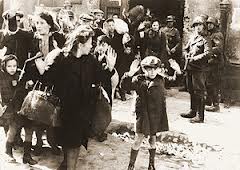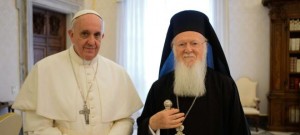Turning points: Syria and the Russian diplomacy. Stalingrad syndrome.
“Damascus is the “Stalingrad” of Russian diplomacy. After years of geopolitical withdrawal, Moscow has chosen Syria as a way to revive its image of power in the world. “Not one step back” is the Kremlin’s new strategy, as it was for the Red Army along the banks of the Volga river during World War II. To be more convincing, the Kremlin has simultaneously flexed its muscles by supplying sophisticated […]
Afghanistan, The Istanbul Process goes on.
26 Apr 2013 Almaty hosted the Third Ministerial Conference of the Istanbul Process on Afghanistan with the participation of Kazakhstan’s President Nursultan Nazarbayev. More than 50 delegations, led by the foreign ministers of the participating states, supporting countries and heads of international organizations, attended the Almaty Conference. The participants fully supported the plans of the regional countries to cooperate on Afghanistan and confirmed their willingness to purposefully expand and deepen regional cooperation based on the principles of friendship, respect and mutual benefit. 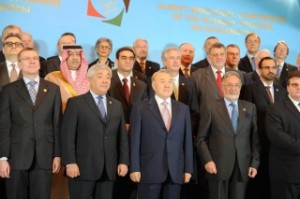
In his welcoming remarks, President Nursultan Nazarbayev highlighted the importance of regional cooperation and outlined Kazakhstan’s role in the international community’s plans on Afghanistan. He noted that Kazakhstan had been providing political, economic and humanitarian assistance to Afghanistan starting from the 1990s directly or through international efforts.
Following the Conference, the participants adopted a final declaration, in which the parties confirmed their intention to continue to support Afghanistan’s engagement in the economic and political life of the region. The Conference participants highlighted the importance of these measures in the context of the withdrawal of International Security Assistance Forces from Afghanistan. They also adopted specific action plans for each of the six packages of the confidence-building measures of the Istanbul Process.
The third Ministerial meeting of the foreign ministers of the Istanbul Process has allowed the regional countries to harmonize their approaches on conducting a policy dialogue with Afghanistan and identify concrete measures of cooperation in the fields of education, economy, fight against terrorism, drug trafficking, and natural disasters, as well as the development of regional infrastructure.
The supporting countries and international organisations expressed full support for the intentions of the regional states and identified forms and conditions of their participation in the development of cooperation measures on behalf of Afghanistan. The sides emphasized their willingness to work closely in the context of international and regional organisations such as the UN, SCO, CICA, OSCE, CSTO, ECO and other.
A number of side events took place during the Almaty Conference. These included a presentation by the mayor of Almaty Akhmetzhan Yessimov on the opportunity to turn the city into a regional hub of multilateral diplomacy; an expert level seminar of the relevant bodies of the member countries of the Istanbul Process on Kazakhstan’s potential as a transit and transport corridor; an exhibition of Kazakhstan’s goods and products for export to Afghanistan.
Kazakhstan remains a reliable foreign partner of Afghanistan. Astana is committed to the development of political contacts with Kabul both in bilateral and multilateral formats.
In accordance with the adopted Declaration, the next Conference of the foreign ministers of the Istanbul Process on Afghanistan will be held in China in 2014. In this regard, Kazakhstan expresses its gratitude to the Chinese side not only for their willingness to host the fourth meeting, but also for full support and contribution to the development of the Istanbul Process.
Statement from MFA Kazakhstan
Poland does not expect the EU Council to lift this year the Excessive Deficit Procedure, an EU mechanism for enforcing fiscal rules. The country missed its public-deficit target for 2012 according to the recently released data from the Central Statistical Office (GUS). 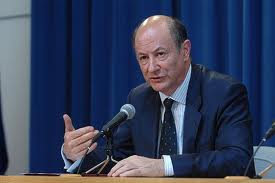
Warsaw has been subject to scrutiny from Brussels since 2009 for running public deficits above the EU’s limit of 3% of gross domestic product. Despite initial plans to shrink the gap to 2.97%, the 2012 deficit ended up at 3.9% of GDP, GUS said.
“The Polish government believes it will reduce its general government deficit to 3.5% of GDP in 2013, thus paving the way to lifting excessive deficit procedure in 2014 versus previously expected 2013”, Polish Finance Minister Jacek Rostowski said at a news conference.
Of the EU’s 27 members, 20 are currently under an Excessive Deficit Procedure for missing deficit targets.
Poland is the only European Union country to have avoided a recession since the Lehman Brothers’ collapse in 2008, but its expansion decelerated to 1.9% last year from 4.5% in 2011, according to recent data.
With the prolonged troubles of the eurozone undercutting the country’s export industries, rising unemployment, and pressure on private consumption and investment, the finance ministry cut its growth forecast for 2013 to 1.5%
Poland. Warsaw Ghetto Uprising, 70 years later.
23 Apr 2013“The Polish capital of Warsaw marked the 70th anniversary of the Warsaw Ghetto Uprising of 1943, when hundreds of young, poorly armed Jews staged an ultimately doomed revolt against the Nazis.
Poland was once a Jewish bastion in Europe, 90% of the country’s 3.3 million pre-war Jewish residents were dead by 1945.
One synagogue remains in Warsaw, but it is tucked discreetly away among the skyscrapers and apartment buildings of the capital’s downtown area. To honour the occasion of the 70th anniversary of the uprising, the Museum of the History of Polish Jews is now open. The museum is funded by the Polish state, the city of Warsaw, and several private donors.
The Warsaw Ghetto was the biggest of all of Nazi-occupied Europe’s Jewish Ghettos during World War II, but Germans razed the neighbourhood and the post-war communist regime later built houses directly over the rubble. Three small fragments of the ghetto’s wall survived”.
Article – France 24 – April 2013.
«Дело «МК» как зеркало времени.
11 Apr 2013«Отнюдь не каждый политический материал газеты «МК» вызывает у меня восторг как у журналиста. Тем более что как немец я всегда ищу волосок в супе. Но в ставшей знаменитой статье большевичка Любовь Яровая, которая «сдает» собственного мужа, — убедительный прототип современных «танков в юбке». И фактура убедительная… 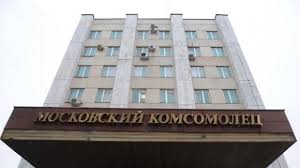
Но все-таки я сомневаюсь, что женщины в современной российской политике, и конкретно в Госдуме, опередили коллег-мужчин в стремлении подстраивать свои убеждения под актуальные потребности власти ради сиюминутных, а еще лучше постоянных выгод. Беспринципность и оппортунизм — были и пока остаются прерогативой преимущественно мужского пола. Сколько представительных мужчин — и в Думе, и вне ее — ходят в нравственных юбках гораздо короче, чем у женщин-политиков?
Критиковать статью Георгия Янса можно только за то, что он недостаточно широко обрисовал образ современного российского политика. Подобных, кстати, хватает и вне России…
На Западе считают, что любой бред дезавуируется сам по себе. Поэтому до судебных разбирательств дело доходит редко. В Бундестаге все заканчивается ритуальными выговорами, иногда не менее ритуальными извинениями. В других случаях дело выносится на суд общественного мнения. И тогда обиженный деятель либо удовлетворяется поддержкой широкой публики, либо осознает, что его ругали по делу и не стоит дальше лезть на рожон.
В России, как видим, другие обычаи…
Статья – Штефан Шолль – Московский Комсомолец Stefan Scholl Moskovskij Komsomolets
Восточная Европа – это неинтересно.
10 Apr 2013« … В последнее время статьи о России, об СНГ, о Восточной Европе стали менее востребованными в международной прессе. Даже немцы со своим традиционным интересом к востоку закрыли ряд корпунктов в Москве. Пора признать очень неудобную правду для такого профильного журналиста, как я: Россия сегодня — немодная, Украина — скучная, как и всё СНГ, а бывшие соцстраны, каждая со своей скоростью, уже более-менее интегрировались в ЕС. 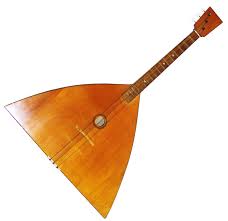
Политическая динамика в этом макрорегионе ясна, и в ближайшие времена резкие перемены не ожидаются. Непростая для журналиста ситуация усугубляется еще и резким падением влияния этих стран на судьбы человечества…
В глобализированном мире ситуация кардинально изменилась: границы открыты, люди свободно путешествуют. Технологическая революция дала широкие возможности любому гражданину и СМИ….
Какие сейчас самые привлекательные для СМИ текущие события в мире? Давайте попробуем перечислить.
Энергетическая революция в США и Северной Америке в целом.
Китайское развитие.
Иранский и северокорейский ядерные планы.
Проблема суверенитета островов в Желтом море.
Последствия «арабской весны» в Африке и на Ближнем Востоке.
Посткризисная эволюция в политике и финансовой среде ЕС.
Бразильский экономический бум и бурная обстановка в Венесуэле.
Религиозные перемены в католической церкви…
А что Россия? Что она делает во время столь бурных мировых перемен? Какие ответы дает на вызовы современности?…
Грустно об этом говорить, но, похоже, скоро придется ждать нового падения метеорита или первого боя чемпиона по боксу Виталия Кличко в Верховной раде, чтобы мир снова обратил внимание на Россию или на Украину.
Статья – Джузеппе Д’Амато Московский Комсомолец Giuseppe D’Amato Moskovskij Komsomolets.
Прощай, Маргарет Тэтчер!
9 Apr 2013«Мир в его нынешнем виде – плод политического брака мужчины и женщины. Маргарет Тэтчер и Рональда Рейгана.
Они, а вовсе не слабохарактерный Горби, разметали в пух и прах СССР. 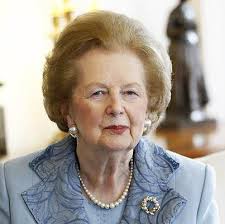
Таких политических хищников больше нет и, вероятно, не будет. Пришло время травоядных Обамы, Оланда, Меркель.
Многие (может быть, в силу возраста) не понимают исторического значения этих (простите, тех) людей-эпох. Не могут спроецировать их личностную величину на настоящее время.
А я старый перец. Я могу.
При Обаме-Оланде-Меркель Путин может вести себя, как Путин. При Тэтчер и Рейгане он был бы совершенно другим. В этом, на мой взгляд, главная разница времен.
У покойной был такой твердый политический пенис, о котором нынешние лидеры Запада не могут даже мечтать.
Вечная память Тэтчер. Как бы кто к ней ни относился.
Она была … »
Блог – Айдер Муждабаев – МК
Борис Березовский Распутин.
24 Mar 2013«Умер Борис Березовский – изумительно талантливый человек, игравший роль злого гения в российской политике позапрошлого десятилетия.
За все последние сто лет в России был только один другой персонаж, сравнимый с Березовским – фаворит последней императорской четы Григорий Распутин… 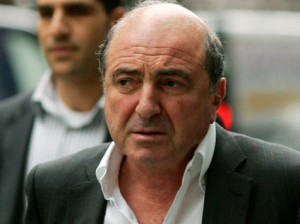
Начало 90-ых годов многие высшие деятели российской власти встретили в состоянии восторженного идеализма…
Это время политической невинности заведомо не могло длиться долго…
Дослужившийся в советскую эпоху до довольно скромной должности заведующего лабораторией в Институте проблем управления Академии наук Борис Абрамович Березовский оказался неожиданным символом этой потери невинности.
От прихоти этого демонического персонажа зависело: кто останется министром или даже премьером, кому суждено пасть, а кому возвыситься, кто должен стать сказочно богатым, а кому суждено обнищать…
Осенью 1996 года Бориса Абрамовича за заслуги в деле переизбрания президента Ельцина на второй срок назначили на его первую государственную должность – заместителя секретаря совета безопасности РФ…
Штаб-квартира Бориса Абрамовича в старинном особняке на Новокузнецкой улице в Москве была в те годы реальным нервным центром политической жизни страны. Министры, губернаторы и депутаты могли часами дожидаться ” хозяина” в многочисленных местных приемных, каждая из которых была предназначена для просителей строго определенного ранга…
Почему для многих именно он, а не, допустим, Ельцин является символом 90-ых? Мне кажется, что это произошло в силу комбинации случайного везения и многих объективных факторов. Березовский был блестящим манипулятором. Он умел создавать отношения с десятками и сотнями важных людей и превращать их в свои марионетки. Березовский умел создавать в уме изощренные политические и бизнес-комбинации, а затем неукоснительно проводить их в жизнь. Березовский был абсолютно безжалостен. Люди были для него пешками. Если возникала необходимость, он без колебаний смахивал их с шахматной доски. Березовский лучше всех ухватил дух времени. Он первым понял правила жизни в новой реальности и сумел стать жестоким королем этой реальности. Березовский был исключительно циничным человеком… »
Статья – Михаил Ростовский –Московский Комсомолец 23 марта 2013 Mikhail Rostovsky Moskovskij Komsomolets
Cipro, un bel grattacapo per la Russia.
24 Mar 2013 I russi sono letteralmente furibondi: non sono stati consultati dagli europei, quando Bruxelles ha proposto a Nicosia il prelievo forzoso dai conti correnti bancari.
Eppure Mosca credeva di essersi guadagnata la fiducia internazionale, avendo già prestato a Cipro nel 2011 ben 2,5 miliardi di dollari, mentre i “partner” continentali continuavano ad osservare la situazione creatasi sull’isola del Mediterraneo senza alzare un dito. 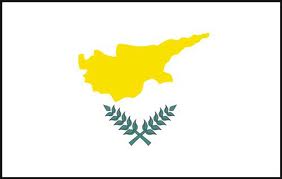
La delusione è tanto più grande, poiché tutti i meccanismi di consultazione con l’Ue si sono dimostrati inadeguati. Il gruppo di Paesi, che continua a vedere nell’ex superpotenza comunista un pericolo, ha imposto la scelta del prelievo forzoso proprio per colpire Mosca.
In queste convulse ore le cifre sono state confermate anche dalla Banca centrale di Cipro: su 68 miliardi nei forzieri, una trentina appartengono a russi. Il che potrebbe significare una perdita spaventosa. Il buco da coprire in fretta a Nicosia si aggira sui 5,8.
Persino società, controllate dallo Stato federale, hanno i conti bloccati sull’isola mediterranea, ha ammesso il premier Dmitrij Medvedev, che ha ipotizzato la creazione in qualche regione periferica dell’immenso gigante slavo di speciali aree off-shore.
“Molliamogli Kaliningrad-Koenigsberg (con la Prussia orientale) e prendiamoci Cipro”, scriveva ironicamente in un editoriale il popolare Moskovskij Komsomolets.
Non c’è magnate famoso o compagnia importante che non abbia una sede in quella che un tempo veniva considerata l’isola del tesoro, dove i soldi venivano messi al sicuro lontani dalle grinfie di burocrati corrotti. Adesso toccherà trovare ospitalità da qualche altra parte. La favola è finita!
Cipro è da anni ai primi posti tra i Paesi investitori diretti in Russia. In realtà, questi sono capitali di ritorno che, in pratica, godono nella Patria ritrovata di una giurisdizione diversa da quella nazionale. Ecco un’altra ragione della creazione di una piazza finanziaria del genere.
Gli europei hanno sfruttato l’occasione per rimettere ordine nello spazio dell’euro. Si sono levati un bel sasso dalle scarpe, considerando alcune chiacchierate operazioni messe a segno nell’ultimo decennio dagli spericolati oligarchi moscoviti.
Il rischio è, però, che questa operazione sia un boomerang. All’apertura delle banche cipriote i soldi dei russi (quelli non tassati) prenderanno certamente il volo. Il buco cipriota potrebbe allora trasformarsi in una voragine quattro volte maggiore. Il governo federale ha minacciato anche di cambiare la composizione delle proprie riserve valutarie, riducendo le quote dell’euro. Il che significherebbe giorni difficili per la moneta unica.
Dal 26 marzo a Durban è previsto il summit annuale dei Paesi emergenti del Brics (Brasile, Russia, India, Cina e Sud Africa). I russi, che hanno il loro tallone d’Achille dalla dipendenza eccessiva dal prezzo del petrolio, probabilmente prepareranno qualche sorpresa. Allontanarsi in un sol colpo da euro e dollaro? Difficile. Spingeranno intanto per il rafforzamento del cinese yuan, come valuta di riferimento. Il summit al Cremlino con la nuova dirigenza di Pechino è giunto proprio a puntino.
Tenere viva nel mondo la sete dell’Assoluto. Questa l’esortazione indicata da Papa Francesco nel discorso rivolto ai rappresentanti delle Chiese e delle comunità ecclesiali, del popolo ebraico e delle varie religioni, incontrati nella Sala Clementina in Vaticano. Poco prima, il Pontefice aveva incontrato il Patriarca ortodosso ecumenico, Bartolomeo I – con cui si è intrattenuto per circa 20 minuti e che più tardi ha ringraziato come “mio fratello Andrea” – e il Metropolita Hilarion, del Patriarcato di Mosca.
Bartolomeo I e Hilarion hanno donato al Papa due icone mariane. Nell’incontro nella Sala Clementina, Papa Francesco – che ha espresso la “ferma volontà” di proseguire il cammino nel dialogo ecumenico – ha poi ricordato lo speciale vincolo spirituale con il popolo ebraico, l’importanza della cooperazione con i fedeli di altre religioni e la meta dell’unità tra i credenti in Cristo.
Papa Francesco, rivolgendosi ai delegati delle Chiese Ortodosse e delle Comunità ecclesiali d’Occidente, ha indicato una prospettiva intima e peculiare, quella tracciata dal suo sguardo proteso verso Piazza San Pietro in occasione della Messa per l’inizio del ministero petrino:
“Ho riconosciuto spiritualmente presenti le comunità che rappresentate. In questa manifestazione di fede mi è parso così di vivere in maniera ancora più pressante la preghiera per l’unità tra i credenti in Cristo e insieme di vederne in qualche modo prefigurata quella piena realizzazione, che dipende dal piano di Dio e dalla nostra leale collaborazione”.
Il Pontefice, dopo aver chiesto ai rappresentanti delle Comunità cristiane una speciale preghiera affinché “possa essere un Pastore secondo il cuore di Cristo”, ha ricordato che il migliore servizio alla causa dell’unità tra i cristiani è vivere in pienezza la fede, dando “una testimonianza libera, gioiosa e coraggiosa”.
“Più saremo fedeli alla sua volontà, nei pensieri, nelle parole e nelle opere, e più cammineremo realmente e sostanzialmente verso l’unità”.
Il Papa si è poi rivolto ai rappresentanti del popolo ebraico, al quale – ha detto – ci lega uno “specialissimo vincolo spirituale”:
“Vi ringrazio della vostra presenza e confido che con l’aiuto dell’Altissimo, potremo proseguire proficuamente quale fraterno dialogo che il Concilio auspicava e che si è effettivamente realizzato, portando non pochi frutti, specialmente nel corso degli ultimi decenni”.
Salutando i rappresentanti di altre religioni, Papa Francesco si è rivolto in particolare ai musulmani:
“Apprezzo molto la vostra presenza: in essa vedo un segno tangibile della volontà di crescere nella stima reciproca e nella cooperazione per il bene comune dell’umanità”.
La Chiesa cattolica – ha spiegato il Pontefice – è consapevole dell’importanza del dialogo interreligioso:
“La Chiesa cattolica è consapevole dell’importanza che ha la promozione dell’amicizia e del rispetto tra uomini e donne di diverse tradizioni religiose; questo voglio ripeterlo: promozione dell’amicizia e del rispetto tra uomini e donne di diverse tradizioni religiose. (…) Essa è ugualmente consapevole della responsabilità che tutti portiamo verso questo nostro mondo, verso l’intero creato, che dobbiamo amare e custodire. E noi possiamo fare molto per il bene di chi è più povero, di chi è debole e di chi soffre, per favorire la giustizia, per promuovere la riconciliazione, per costruire la pace”.
Servizio completo – Radio Vaticana – Andrea Lomonaco – 20.03.2013
18 Mar: New SIPRI data on arms transfers – China replaces UK as world’s fifth largest arms exporter
China has become the fifth largest exporter of major conventional arms worldwide, according to new data on international arms transfers published by SIPRI. This is the first time China has been in the top five arms exporters since the end of the cold war. Overall, the volume of international transfers of major conventional weapons grew by 17 per cent between 2003–2007 and 2008–12.
The five largest suppliers of major conventional weapons during the five-year period 2008–12 were the United States (30 per cent of global arms exports), Russia (26 per cent), Germany (7 per cent), France (6 per cent) and China (5 per cent). This is the first time that the UK has not been in the top five since at least 1950, the earliest year covered by SIPRI data. China’s displacement of the UK is the first change in the composition of the top five exporters in 20 years.
The volume of Chinese exports of major conventional weapons rose by 162 per cent between 2003–2007 and 2008–2012, and its share of the volume of international arms exports increased from 2 to 5 per cent.
‘China’s rise has been driven primarily by large-scale arms acquisitions by Pakistan,’ said Dr Paul Holtom, Director of the SIPRI Arms Transfers Programme. ‘However, a number of recent deals indicate that China is establishing itself as a significant arms supplier to a growing number of important recipient states.’
Asian imports strengthen naval capabilities
In the period 2008–12 Asia and Oceania accounted for almost half (47 per cent) of global imports of major conventional weapons. The top five importers of major conventional weapons worldwide—India (12 per cent of global imports), China (6 per cent), Pakistan (5 per cent), South Korea (5 per cent), and Singapore (4 per cent)—were all in Asia.
Several countries in Asia and Oceania have in recent years ordered or announced plans to acquire long-range strike and support systems that would make them capable of projecting power far beyond their national borders. Last year notably saw the delivery of a nuclear-powered submarine from Russia to India and the commissioning of China’s first aircraft carrier, Liaoning.
Other regional players are seeking to establish or strengthen submarine fleets, including several South East Asian countries and Australia, which is also acquiring large surface warships and combat aircraft. These developments come at a time of heightening tensions over territorial disputes in the East and South China seas.
Austerity bites in the European arms market
Deliveries to European countries fell by 20 per cent between 2003–2007 and 2008–12. European states seem eager to abandon or reduce a range of arms import plans. During 2012 Italy and the Netherlands reduced their orders for F-35 combat aircraft from the USA, while Bulgaria, Croatia and Romania dropped plans for newly produced combat aircraft in favour of second-hand options.
Many European states are also seeking to export newly acquired combat aircraft that they can no longer afford to maintain. For example, Portugal is seeking buyers for its new fleet of F-16s and Spain is seeking to sell newly purchased Eurofighter Typhoons.
‘With the financial crisis in Europe, the withdrawal from Iraq and the drawdown in Afghanistan, we can expect to see Europe trying to export a considerable volume of surplus military equipment,’ said Mark Bromley, Senior Researcher with the SIPRI Arms Transfers Programme.
Other notable developments
- Russia accounted for 71 per cent of exports of major weapons to Syria in 2008–12 and continued to deliver arms and ammunition in 2012.
- The Arab states of the Gulf accounted for 7 per cent of world arms imports in 2008–2012. Missile defence systems were an important element in their latest arms acquisitions, with orders placed in 2011–12 for Patriot PAC-3 and THAAD systems from the USA.
- Deliveries of weapons system to Venezuela as part of its ongoing rearmament programme continued in 2012. Russia accounted for 66 per cent of transfers to Venezuela, followed by Spain (12 per cent) and China (12 per cent).
- Imports by North African states increased by 350 per cent between 2003–2007 and 2008–12, which was almost entirely responsible for a doubling (by 104 per cent) in imports by Africa as a whole.
- Sub-Saharan imports increased by just 5 per cent. Most countries in sub-Saharan Africa imported only small numbers of major weapons, but many of these have been used in internal conflicts or in interventions in conflicts in neighbouring states, most recently in Mali.
- Greece’s arms imports fell by 61 per cent between 2003–2007 and 2008–12, pushing it from the number 4 importer to number 15. In 2006–10 Greece was the top recipient of German arms exports and the third largest recipient of French arms exports.
Welcome
We are a group of long experienced European journalists and intellectuals interested in international politics and culture. We would like to exchange our opinion on new Europe and Russia.
Categories
- Breaking News (11)
- CIS (129)
- Climate (2)
- Energy&Economy (115)
- EU Eastern Dimension (85)
- Euro 2012 – Sochi 2014 – World Cup 2018, Sport (43)
- Euro-Integration (135)
- History Culture (198)
- International Policy (261)
- Military (74)
- Interviews (18)
- Italy – Italia – Suisse (47)
- Odd Enough (10)
- Poland and Baltic States (126)
- Religion (31)
- Russia (421)
- Survey (4)
- Turning points (4)
- Ukraine (176)
- Российские страницы (113)
Archives
- November 2020
- October 2020
- September 2020
- August 2020
- July 2020
- May 2020
- April 2020
- March 2020
- January 2020
- December 2019
- November 2019
- October 2019
- September 2019
- August 2019
- July 2019
- June 2019
- May 2019
- April 2019
- March 2019
- February 2019
- December 2018
- November 2018
- October 2018
- September 2018
- August 2018
- July 2018
- June 2018
- May 2018
- April 2018
- March 2018
- February 2018
- January 2018
- December 2017
- November 2017
- October 2017
- September 2017
- August 2017
- July 2017
- May 2017
- March 2017
- January 2017
- December 2016
- November 2016
- October 2016
- September 2016
- July 2016
- June 2016
- May 2016
- April 2016
- February 2016
- January 2016
- November 2015
- October 2015
- September 2015
- June 2015
- April 2015
- March 2015
- February 2015
- January 2015
- December 2014
- November 2014
- October 2014
- September 2014
- August 2014
- July 2014
- June 2014
- May 2014
- April 2014
- March 2014
- February 2014
- January 2014
- December 2013
- November 2013
- October 2013
- September 2013
- August 2013
- July 2013
- June 2013
- May 2013
- April 2013
- March 2013
- February 2013
- January 2013
- December 2012
- November 2012
- October 2012
- September 2012
- August 2012
- July 2012
- June 2012
- May 2012
- April 2012
- March 2012
- February 2012
- January 2012
- December 2011
- November 2011
- October 2011
- September 2011
- August 2011
- July 2011
- June 2011
- May 2011
- April 2011
- March 2011
- February 2011
- January 2011
- December 2010
- November 2010
- October 2010
- September 2010
- August 2010
- July 2010
- June 2010
- May 2010
- April 2010
- March 2010
- February 2010
- January 2010
- December 2009
- November 2009
- October 2009
- September 2009
- August 2009
Our books





